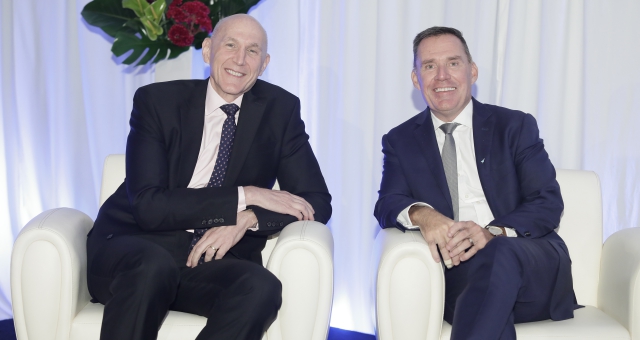AccorHotels Asia Pacific Chairman and CEO, Michael Issenberg, and Chief Operating Officer Pacific, Simon McGrath, say the hospitality industry is currently undergoing a phase of enormous change and consolidation and that hoteliers must embrace change as a constant.
The executives were speaking at the annual AccorHotels nationwide roadshow this week, which brought together senior leaders from across the group’s hotels, the Qantas Lounges, Accor Vacation Club, Accor Plus and executive teams.
“Our group has gone through a remarkable 12 months,” Issenberg said. “Last year we closed the deal with China’s Huazhu Hotels Group which gives us access to 70 million loyalty members in the leading outbound market in the region, and successfully integrated the Raffles, Fairmont and Swissotel brands into the business, both of which have been transformational.
“AccorHotels is now the second largest luxury operator in the world with 240 luxury hotels in Asia Pacific and over 500 globally – and we’re already seeing the perception shift with owners, partners, the public and our staff.
“It was also a remarkable year for growth with the addition of 86 new hotels to the region, which is a record as well as a record year of signings, which means we have over 300 properties in the pipeline. We’re also continuing to add value through acquisitions including in the luxury home rental sector,” he said.
Issenberg dismisses the term “sharing economy”, describing it as more of a thin digital layer over under-utilised assets.
“We’re looking at private rental to deliver a level of service that Airbnb doesn’t offer,” he said. “Concierge provider, John Paul greatly enhances our Le Club AccorHotels loyalty program services and further enables us in this market.”
Asia Pacific now accounts for 26 per cent of AccorHotels global footprint with 761 hotels and 154,000 rooms across 17 countries.
Issenberg touched on the trend of lifestyle hotels, an area the group is expanding in, thanks to new brands including Mama Shelter, 25hours and Jo&Joe.
“This significant change to our brand portfolio allows us to innovate more quickly and has opened up new opportunities for development of our talent,” he said.
Issenberg went on to point out that while its digital strategy remains a key focus, ultimately it is the way each hotel looks after its guests that is at the core of its business.
McGrath discussed the importance of embracing business change which is customer-led in an era where social media is driving the propensity for travel, and at a time when the tourism industry has become a leading super-growth sector for the Australian economy.
“Change will continue to be our weapon over the coming years,” he said. “We’re taking action to keep pace with emerging trends in our industry, whether that is bringing people together in the heart of our hotels, integrating guest experiences beyond hotels, ensuring that good design is not just for our high-end and luxury hotels, and constantly looking at new concepts to evolve our loyalty programs.”
AccorHotels loyalty program has rapidly grown to reach record heights, with one in 12 Australians now members of Le Club AccorHotels, and this customer loyalty is helping to drive a substantial level of direct business into the Group’s hotels.
“We are obsessive about the guest experience and developing AccorHotels as a consumer-facing brand through loyalty. We’re striving for a target of six million loyalty members in Australia with 1 in 4 Australian’s members of Le Club AccorHotels,” McGrath said.
“Hotel technology is no longer optional but essential and there will be ongoing investment to ensure we are updating systems and customer-facing platforms.”
McGrath closed the session with three key themes that will take AccorHotels into the future to stay ahead of its competitors, which included harnessing millennial thinking; broadening leadership and embracing the benefits of diversity in hotel management teams; and enabling open communication across all facets from guests, employees, partners and owners.
McGrath confirmed that the development pipeline in the Pacific “remains the absolute focus of the team” and this has been reinforced by the current pipeline strength being at record levels.
AccorHotels has one of the strongest development pipelines in the Pacific region, with more than 20 hotels and 3,500 rooms expected to open over the next three years.
A total of ten hotels representing 2,000 rooms across all market segments from economy to luxury are expected to open in 2017, with a further 11 hotels due to open in 2018.
This growth can be attributed to AccorHotels’ above-market performance assisted by the Group’s dynamic and strong international brands that work together to provide guests with the full range of hotel experiences.


